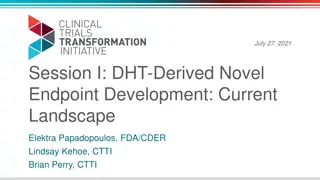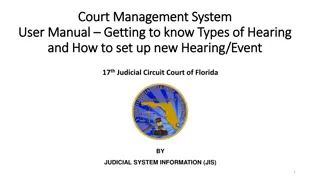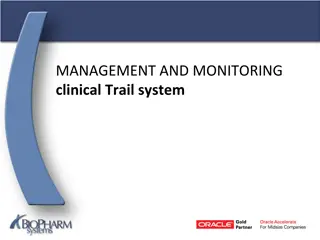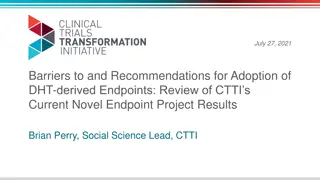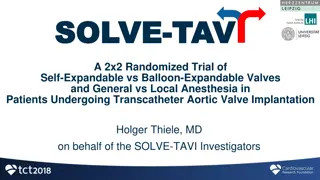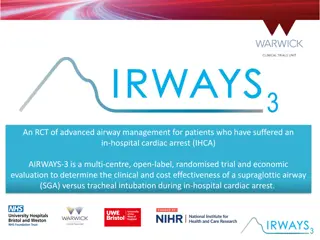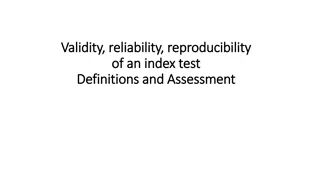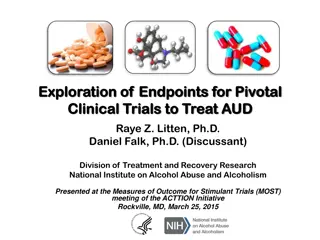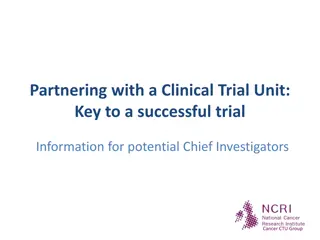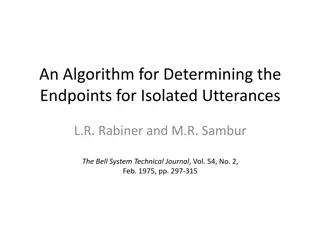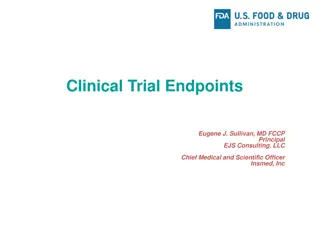Zongertinib Trial in HER2 Aberrant Tumors
Zongertinib (BI.1810631) Phase I Study in Advanced Solid Tumors with HER2 Aberrations focusing on NSCLC. The trial involves dose escalation and expansion, testing different doses in cohorts with varied HER2 mutations. Primary endpoints include MTD, OR, and DLTs.
2 views • 14 slides
OCTIVUS Randomized Clinical Trial: OCT-Guided vs IVUS-Guided PCI
The OCTIVUS Randomized Clinical Trial compared the clinical efficacy and safety of Optical Coherence Tomography (OCT)-guided and Intravascular Ultrasound (IVUS)-guided strategies in patients undergoing PCI for significant CAD. The study aimed to determine if OCT-guided PCI is noninferior to IVUS-gui
11 views • 27 slides
ARREST Trial: Expedited Transfer for Non-ST Elevation OHCA
This prospective, multicentre, randomised clinical trial led by Dr. Tiffany Patterson aims to determine whether direct delivery to a cardiac arrest centre following non-ST elevation out-of-hospital cardiac arrest reduces deaths compared to delivery to the nearest emergency department. Funded by the
0 views • 17 slides
Efficacy and Safety of Ferric Carboxymaltose for Heart Failure with Iron Deficiency
Iron deficiency is prevalent in heart failure patients with reduced ejection fraction and is linked to poor outcomes. The HEART-FID trial investigates the impact of intravenous ferric carboxymaltose (FCM) on all-cause mortality, heart failure hospitalizations, and exercise capacity in chronic HFrEF
1 views • 17 slides
Early Vasopressors in Sepsis Clinical Trial: Improving Patient Outcomes
This UK-wide clinical trial aims to assess the effectiveness of early peripheral norepinephrine infusion in adult patients with septic shock. The study will compare the impact on mortality and other outcomes of targeting a mean arterial pressure (MAP) above 65mmHg within the first 48 hours of admiss
1 views • 9 slides
Digital Health Technology-Derived Clinical Outcome Assessments in Regulatory Decision-Making
This session discusses the landscape of DHT-derived novel endpoints in clinical research, focusing on considerations for regulatory decision-making. It explains the use of digital health technology in clinical outcome assessments and highlights the potential benefits of digitally collected COAs, suc
0 views • 42 slides
Empagliflozin Effects on Heart Failure with Reduced Ejection Fraction: EMPEROR-Reduced Trial Overview
Empagliflozin's impact on cardiovascular and renal events in heart failure with reduced ejection fraction was assessed in the EMPEROR-Reduced trial led by Milton Packer, MD, and Faiez Zannad, MD. The trial, enriched for patients with severe left ventricular dysfunction, randomized participants to em
2 views • 22 slides
Statistical Methods for Clinical Endpoints in Diabetes Research
This educational slide module delves into fundamental statistics for analyzing clinical endpoints in diabetes research. It covers the choice of statistical methods, the distinction between statistical and clinical significance, and the importance of different endpoints in evaluating clinical benefit
1 views • 37 slides
Comparison of FFR-guided PCI vs Angiography-guided PCI in AMI with Multivessel Disease: FRAME-AMI Trial
In patients with acute myocardial infarction (AMI) and multivessel coronary artery disease, this study aims to compare fractional flow reserve (FFR)-guided PCI with angiography-guided PCI for non-infarct-related artery lesions. The hypothesis is that selective PCI guided by FFR is superior to routin
2 views • 23 slides
Simulation Techniques in Clinical Trial Design
Explore the process of simulating clinical trial designs, including traditional and adaptive approaches. Learn how to generate data, conduct analysis, make within-trial decisions, and summarize results using fixed-sample two-arm parallel group trials and group-sequential designs. Dive into methods l
1 views • 23 slides
Different Types of Hearings in the Court Management System
Explore the various types of hearings available in the Court Management System, such as Motion Calendar, Special Sets, Calendar Call/Trial, Pre-Trial Conference, and Case Management. Learn how to set up new hearings/events and understand the process of generating trial orders and pre-trial conferenc
0 views • 18 slides
Digital Differential Analyzer (DDA) Algorithm in Computer Graphics
In computer graphics, the Digital Differential Analyzer (DDA) Algorithm is utilized as the basic line drawing algorithm. This method involves interpolation of variables between two endpoints to rasterize lines, triangles, and polygons efficiently. The algorithm requires inputting coordinates of two
1 views • 9 slides
The CLEAR Trial: Investigating Hypertonic Saline and Carbocisteine in Bronchiectasis
The CLEAR Trial is a 2x2 factorial randomized trial evaluating the effectiveness of hypertonic saline and carbocisteine for airway clearance in bronchiectasis over 52 weeks. Led by Professor Stuart Elborn and Professor Judy Bradley from Queen's University Belfast, the trial focuses on clinical and c
1 views • 23 slides
Comprehensive Guide to Clinical Trial Management Systems (CTMS)
Explore the world of Clinical Trial Management Systems (CTMS) including what it is, who needs it, key functions, and benefits. Learn how CTMS centralizes trial management, streamlines processes, and enhances decision-making for organizations managing multiple clinical trials.
0 views • 18 slides
NCI-MATCH Trial Interim Analysis Results and Status Update
NCI-MATCH is a groundbreaking clinical trial aiming to match tumor gene alterations with targeted therapies. The interim analysis results revealed impressive patient enrollment and site participation exceeding expectations. Despite challenges with pausing new patient registrations for the analysis,
0 views • 26 slides
Challenges and Recommendations for DHT-derived Endpoints in Clinical Trials
This study by CTTI explores barriers and solutions for adopting digitally derived endpoints in clinical trials. Through in-depth interviews with industry sponsors, the research identifies gaps, barriers, and recommendations for using DHT-derived novel endpoints as key endpoints in pivotal clinical t
0 views • 16 slides
Essential Elements of Clinical Trial Protocols
Understanding the key components of a clinical trial research protocol is essential for conducting successful studies. This includes identifying session objectives, discussing trial protocol contents, exploring observational study elements, and learning about reporting guidelines. Study objectives f
2 views • 25 slides
Advances in Aortic Valve Development and TAVR Trials
The presentation discusses various endpoints in aortic valve development and Transcatheter Aortic Valve Replacement (TAVR) trials, including comparisons, study stages, and newer devices. It covers different trial populations, primary and secondary endpoints, and the evaluation of non-inferiority. Su
1 views • 18 slides
Comparison of Valve Types and Anesthesia Strategies in Transcatheter Aortic Valve Implantation
In the SOLVE-TAVI trial, patients undergoing transcatheter aortic valve implantation were randomized to receive either self-expandable or balloon-expandable valves under general or local anesthesia. The study aims to compare the effectiveness and safety of different valve types and anesthesia approa
0 views • 27 slides
Family Law Trial Skills Workshop: Evidence Collection and Trial Techniques
Enhance your trial skills in family law with a focus on evidence collection, trial strategies, and client examination. Learn best practices for preserving evidence, drafting persuasive statements, and navigating trials confidently. This workshop covers important aspects of evidence collection, such
0 views • 65 slides
Enhancing Clinical Trial Milestone Predictions with nQuery Predict
Explore the innovative tool nQuery Predict for accurate clinical trial milestone predictions, demonstrated in a webinar hosted by industry experts. Learn about key milestones, adaptive design considerations, enrollment predictions, and the significance of statistical approaches in optimizing trial d
0 views • 23 slides
Analyzing Clinical Trial Results for Rare Diseases: Challenges, Highlights & Missing Data
This analysis delves into the challenges, strengths, weaknesses, and missing data in a clinical trial study focusing on rare diseases. It critiques aspects such as recruitment, study design, surrogate markers, and statistical analysis, offering valuable insights for interpreting clinical trial resul
0 views • 12 slides
Participating in a Mock Criminal Jury Trial Competition
In this competition, students simulate a criminal jury trial where they take on roles as attorneys and witnesses in a fictitious jurisdiction called Midlands. This year's case involves State v. Sinclair, focusing on the murder trial of Skyler Sinclair, a suspect in the death of an undercover officer
0 views • 22 slides
AIRWAYS-3 Trial: Advanced Airway Management in In-Hospital Cardiac Arrest
AIRWAYS-3 is a multi-centre, open-label, randomized trial evaluating the clinical and cost effectiveness of a supraglottic airway (SGA) versus tracheal intubation during in-hospital cardiac arrest (IHCA). The trial aims to determine the functional status and health-related quality of life outcomes o
0 views • 9 slides
The Importance of Validity, Reliability, and Reproducibility in Clinical Measurements
Clinical practice involves measuring quantities to aid in diagnosis, predict patient outcomes, and serve as study endpoints. Errors in measurements can lead to inaccurate results and affect clinical decisions. Trueness and precision, accuracy, bias, and method comparison are essential concepts in as
0 views • 25 slides
Exploration of Endpoints in Clinical Trials for Alcohol Use Disorder
This presentation discusses the exploration of endpoints in pivotal clinical trials to treat Alcohol Use Disorder (AUD), focusing on Primary Alcohol Drinking Endpoints like PSNHDD. Evidence supporting PSNHDD as a primary endpoint includes clinical benefit data from alcohol clinical trials and epidem
0 views • 54 slides
Perception and Awareness of Clinical Research in Trial Participants and the Public of Andhra Pradesh
This study focuses on understanding the perception and awareness of clinical research among trial participants and the general public in Andhra Pradesh. It highlights the importance of creating awareness about clinical research, previous study results, public attitudes towards clinical trials, and e
0 views • 24 slides
The CLEAR Trial: Investigating Hypertonic Saline and Carbocisteine for Bronchiectasis
The CLEAR Trial is a 2x2 factorial randomized trial led by Professor Stuart Elborn and Professor Judy Bradley to assess the effectiveness of hypertonic saline and carbocisteine for airway clearance in bronchiectasis patients over 52 weeks. The trial involves various study sites and potential new sit
0 views • 30 slides
Key Aspects of Partnering with a Clinical Trial Unit for Successful Trials
Understanding the role and benefits of partnering with a Clinical Trial Unit (CTU) is essential for potential Chief Investigators. A CTU handles various aspects of trial coordination, from developing trial materials to overseeing regulatory permissions and data management. UK Clinical Trials Units (
0 views • 48 slides
Pain, Distress, and Humane Endpoints in Animal Research
Explore the concepts of pain, distress, and humane endpoints in animals through a training program aimed at researchers developing protocols for the welfare of laboratory animals. The program includes pre- and post-assessments to gauge knowledge and learning outcomes, covers scenarios illustrating c
0 views • 19 slides
AMTA Criminal Jury Trial Competition Overview
Simulation of a criminal jury trial where students act as attorneys and witnesses in a fictitious jurisdiction called Midlands. This year's case involves the attempted murder of Kerry Bell-Leon, with witness selection varying in each round. Judges play crucial roles in presiding over the trial, scor
0 views • 22 slides
Overview of PaNOSC Workshop API Endpoints & Data Structures
This project discusses the API endpoints and data structures from the PaNOSC Workshop, focusing on reviewing use cases, required search results/data, actors involved, and the design of endpoints reflecting proposal/experiment processes. It covers detailed discussions on data models, instrument setup
0 views • 19 slides
The CLEAR Trial: Investigating Hypertonic Saline and Carbocisteine for Bronchiectasis Patients
The CLEAR Trial, led by Professor Stuart Elborn and Professor Judy Bradley, aims to assess the clinical and cost-effectiveness of hypertonic saline and carbocisteine for airway clearance in bronchiectasis patients over 52 weeks. The trial involves a 2x2 factorial design and various study sites acros
0 views • 23 slides
The CLEAR Trial: Investigating Hypertonic Saline and Carbocisteine for Bronchiectasis Treatment
The CLEAR Trial is a 2x2 factorial randomized trial assessing the clinical and cost-effectiveness of hypertonic saline and carbocisteine for airway clearance in bronchiectasis patients over 52 weeks. Led by Professor Stuart Elborn and Professor Judy Bradley, the trial involves randomization, sealed
0 views • 8 slides
Algorithm for Determining Endpoints in Speech Recognition
This article discusses an algorithm proposed by L.R. Rabiner and M.R. Sambur in 1975 for determining endpoints in isolated utterances. The algorithm focuses on detecting word boundaries in speech through the recognition of silence, which can lead to reduced processing load and increased convenience,
0 views • 22 slides
IGEL Universal Management Suite - Efficient Endpoint Control Solution
IGEL Universal Management Suite (UMS) is a comprehensive system that empowers IT professionals with easy control over all endpoints. Included features like centralized installation, configuration, and update management make UMS a versatile tool for managing IGEL Zero Clients and third-party endpoint
0 views • 25 slides
Clinical Trial Endpoints and Regulatory Basis
Eugene J. Sullivan, MD, explains the importance of establishing efficacy in clinical trials based on substantial evidence from well-controlled trials. The discussion includes primary endpoints for Phase 3 trials, legal and regulatory requirements, and the significance of clinically meaningful effect
0 views • 21 slides
Guidelines for Scientific Endpoints and Humane Interventions in Animal Research
These guidelines outline the identification of scientific endpoints, humane intervention points, and cumulative endpoints in animal research. They emphasize the need for protocols approved by animal care committees, consideration of welfare-appropriate endpoints, and adaptation of endpoints during t
0 views • 17 slides
Phase II Trial Design in Oncology Drug Development by Wendy R. Parulekar, MD, FRCP
This presentation covers the pivotal role of Phase II trials in oncology drug development, emphasizing the importance of preliminary clinical efficacy screening, adverse event profiling, mechanism of action understanding, and target population definition. It discusses various Phase II trial designs,
0 views • 76 slides
Minimizing Pain and Distress in Research Protocols
This content explores the importance of reviewing research protocols to minimize pain and distress in animal experiments. It covers defining pain, distress, experimental and humane endpoints, evaluating management strategies, and ensuring ethical practices. It also includes a quick exercise to asses
0 views • 11 slides





